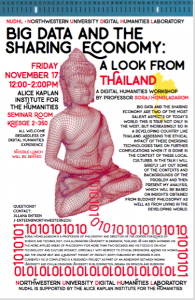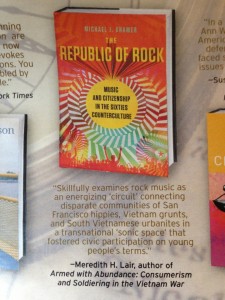Put some digital in your humanities! Put some humanities in your digital!
2 Winter Quarter 2018 Graduate Courses taught by NUDHL co-founders. Spaces available.
1. Introduction to Digital Studies: Approaching Digital Humanities
IPLS 420-0-50 – Hybrid Online/Seminar
Instructor: Dr. Michael Kramer, Co-Founder, NU DH Lab
This course introduces students to the emerging field of critical digital studies, which looks at the intersection of digital technologies and the humanities. Through a blending of intensive weekly online engagements and three, Saturday afternoon seminars (January 13, February 10, and March 17), students gain expertise in digital skills, methods, and understanding as well as deepen their humanities knowledge. Students conduct readings and viewings, explore case studies, and complete online experiments. We pursue vigorous online discussion in addition to our three seminar meetings. Students pursue a final digital project in consultation with the instructor and in relation to individual interests and pursuits (doctoral thesis, capstone project, coursework, public humanities, professional interests, digital humanities methodologies, informatics, library sciences, museum studies, etc.). Weekly topics include: digital annotation and database construction for close reading; “distant reading” tactics; digital mapping and timeline building; data and archives; network analysis; glitching and deformance for hermeneutic interpretation; and platforms and social media for humanities inquiry. This course is required of MALS and COAGS students specializing in Digital Studies or seeking the Digital Studies Certificate. **Any interested graduate student enrolled at Northwestern may take the course as an elective.**
Register at goo.gl/W9gSUp. Questions? Contact Amy Danzer, Assistant Director of Graduate Programs, Northwestern School of Professional Studies, <a-danzer@northwestern.edu> or Dr. Michael Kramer, Co-Founder, NU DH Lab, mjk@northwestern.edu.
2. Imagining the Internet: Fiction, Film, & Theory
IPLS 401-0-50 – Hybrid Online/Seminar
Instructor: Dr. Jillana Enteen, Co-Founder, NUDHL
Much recent fiction, film, and theory are concerned with representing the internet and online environments. Sometimes cyberspace is depicted as a continuation of previous media such as television, cinema, or telephone. Often, however, it is envisioned as a new frontier. This course will examine the ways in which digital interfaces appear in cultural discourses in the past 30 years. We consider how technological objects and tools participate in shaping elements of our culture that may appear natural, logical, or timeless. Our guiding questions will include the following: In what ways are narratives shaping collective perceptions of the internet? Which narratives are influential and why? How have virtual technologies challenged experiences of language, gender, sex, race, ethnicity, and location? How are gender, sexuality, race, ethnicity, and location expressed or erased? We will focus on literary and filmic representations of social networking, gaming, news delivery, and artificial intelligence. Following a Cultural Studies model for inquiry, this course will be text-based with requirements that you develop close reading strategies, as well as showing a commitment to input and revision of your work. This course is required of MALS and COAGS students specializing in Digital Studies or seeking the Digital Studies Certificate. **Any interested graduate student enrolled at Northwestern may take the course as an elective.**
Questions? Contact Amy Danzer, Assistant Director of Graduate Programs, Northwestern School of Professional Studies, <a-danzer@northwestern.edu> or Dr. Jillana Enteen, Co-Founder, NUDHL, j-enteen@northwestern.edu.


